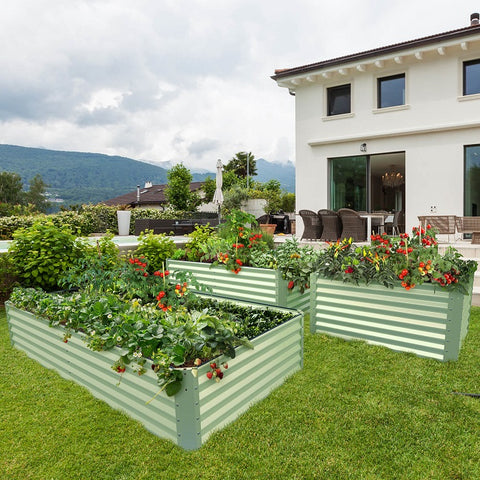Prevent your garden from eroding and losing its ability to sustain plant growth. Knowing how to protect your garden with cover crops will allow it to flourish and produce excellent fruit all year round.The following content also has some reference value for raised garden beds.
Gather information about what cover crops are, why they are good for the garden, when to plant them, and what to plant.
Garden cover crop
Cover crops are planted to cover your soil, not harvest it. They can provide multiple benefits in horticulture or growing systems.
The benefits of planting cover crops
Cover crops help preserve developed soils and provide many immediate and lasting benefits, including:
Soil quality - Cover crops improve soil quality by improving the biological, chemical and physical composition of the soil.
Soil nutrient storage - Cover crops can act as trap crops, storing nutrients from fertilizers, mineralized nitrogen, or residual fertilizers until subsequent plants can use them.

Soil structure - Cover crops can increase soil organic matter, improve soil structure, stability, and improve moisture and nutrient retention capacity for plant development and growth. This reduces runoff by improving water penetration and percolation.
Water infiltration is the movement of water through the surface of the soil.
Water infiltration refers to the movement of water in the soil structure.
Note: These qualities help prevent soil erosion. Learn more about organic soil, how to make it and its benefits.
Soil loss/erosion Prevention - Cover crops slow down rainfall and snowmelt runoff, reducing soil loss from sheet, rill and gully erosion.
Reduce fertilizer use - Cover crop planting to increase soil nitrogen, greatly reducing the need for future crop nitrogen application.
Increased evapotranspiration - Cover crops naturally reduce deep soil moisture through evapotranspiration (soil evaporation and plant transpiration), thereby improving soil structure and stability and reducing subsurface compaction.
Reduced soil compaction - Cover crops naturally reduce soil compaction. Their root systems and, in some crops, taproots penetrate and prevent these layers from compacting.
Weed, pest, and disease prevention - Cover crops are an effective mulch and a natural way to curb soil disease, pest, and weed growth.
Sources of food and shelter - Cover crops provide high quality food and habitat for wildlife, some beneficial insects and pollinators.
Note: Existing weeds, diseases, nematodes, and other soil problems should be considered before planting cover crops. Soil samples should be sent to the local university extension laboratory for evaluation and planting recommendations.

When should you plant cover crops
Cover crops can be planted throughout the growing season, right up to the Mid-Autumn Festival. Please use the following guidelines:
Fall - Plant cover crops so they can grow for at least 4 weeks before cold weather prevents further growth.
Newly cultivated soil - Grow large seed cover crops such as peas, peas, and wheat in shallow, tight furrows. Spread small seed crops such as ryegrass and buckwheat over the garden surface and cover with a light rake.
Spring care - In the spring, turn the cover crop down. It takes at least three weeks for organic matter to decompose before planting a garden.
Prevent cover crops from going to seed. Some species, such as vetch, can become garden weeds if allowed to spread their seeds.
Tip: When cover crops are too tall to turn, cut them before turning them.
What are good garden cover crops
The following varieties and their preferred planting times are ideal garden cover crops:
Alfalfa (spring or summer) and barley (fall or spring), buckwheat (spring), red clover (fall or spring), broad bean (in late summer or early spring), peas (fall), kidney beans (fall), oat (fall or spring)
Note: Every cover crop has its optimal growing conditions (season, soil type, hardiness zone, etc.). Be sure to consult your local nursery, garden supply store, or university promotion for species recommendations.
Garden cover crop
In this article, you learn what cover crops are, how they can benefit your garden, when to plant them and which species to plant.
Planting cover crops will help you protect the soil structure of your garden while enriching it and promoting better biodiversity.
Ignoring the need for garden cover crops can lead to devastating erosion, nutrient loss, and stunted growth of garden plants.









